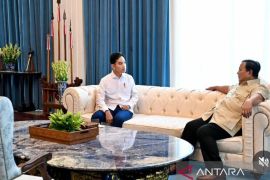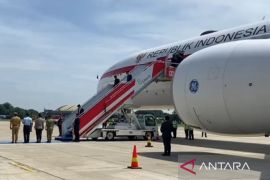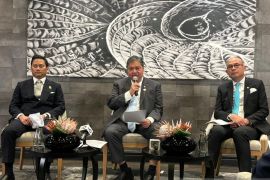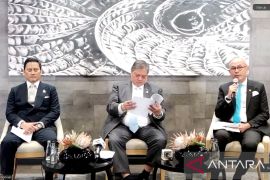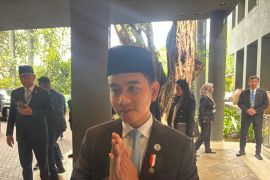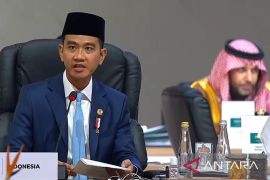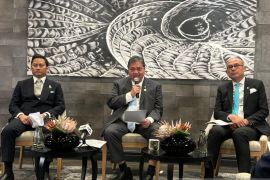However, several digital threats still exist in the form of cyberattacks, data leakage, and online scams, among others, that continue to haunt the digital ecosystem.
According to the International Telecommunication Union's (ITU's) data, by 2022, one out of three people in the world would decide not to utilize the internet, Communication and Informatics Minister Johnny G. Plate stated.
Plate noted that it is caused by the lack of confidence and understanding in using telecommunication technology properly. The fear of digital threats also increases the people’s ignorance in improving their digital literacy and skills.
On the other hand, the world cannot avoid a future that relies heavily on the utilization of digital data by various public and private institutions, he emphasized.
Hence, cross-border data governance and fair utilization of data through the implementation of Data Free Flow with Trust (DFFT) and Cross-Border Data Flow (CBDF) become a pressing need nowadays.
Indonesia, as the chair of the 2022 G20 presidency, proposed the four principles of fairness, lawfulness, transparency, and reciprocity to become the foundation of the cross-border data governance practice.
Furthermore, through the 3rd Digital Economy Working Group (DEWG) Meeting, held in Labuan Bajo, East Nusa Tenggara (NTT) Province, on July 20-22, 2022, Indonesia highlighted digital skills and literacy as the second priority issues of the working group as well as the DFFT and CBDF as its third priority issues.
DEWG is one of the working groups of the G20 that focuses on issues related to the digital economy and highlights the role of digital transformation on economic and social growth.
The minister expected that the meeting, which was attended directly by 17 delegations and virtually by three delegations of the G20 members, could establish three deliverables.
The deliverables comprise the recommendations and policies to increase the involvement of vulnerable groups in the digital economy sector; a G20 Toolkit on digital skills, literacy, and workshop; as well as a summary of practices and policies for the development of advanced digital skills and literacy.
At the meeting, the G20 members also sought a common understanding on a clear definition of trust and general principles in facilitating cross-border data flow.
Spokesperson for the Communication and Informatics Ministry Dedy Permadi said that all parties involved in the 3rd DEWG Meeting concurred on the need to strengthen cross-border data governance.
“The Digital Economy Working Group, or DEWG, had completed discussions regarding the CBDF,” he stated.
The results of the working group’s discussions will be presented at the G20 Digital Economy Ministers' Meeting that is scheduled to take place in Bali in early September of 2022.
To deepen the discussion on CBDF and establish a common agreement on the agenda, Indonesia held a workshop on the last day of the 3rd DEWG Meeting.
In addition to the G20 members, several private actors, international organizations, academics, and non-governmental organizations were invited to partake in the workshop.
“Thus, the agenda does not only represent the government’s interest. Hence, the cross-border data flow agenda will be able to provide (more) comprehensive (data governance) recommendations,” Permadi, who was also the Alternate Chair of the 2022 G20 DEWG, remarked.
Optimizing digital economy
The development of cross-border data governance will not only encourage the establishment of concrete and comprehensive collaborations to accommodate various digital innovations but also recovery of the global digital economy.
Without proper and inclusive data governance, data utilization will not run equitably. It is also possible that data will become a limited commodity, thereby resulting in group-based data utilization.
Hence, the Indonesian G20 Presidency is pursuing concrete deliverables to realize beneficial data utilization for all parties.
Plate had drawn attention to the increasing use of digital technology nowadays. Digitalization is expected to continue to drive global economic growth in the following years, as it is forecast to grow, from around US$520 billion (Rp7,780 trillion) in 2021 to US$1.2 trillion (Rp17,954 trillion) in 2026.
Meanwhile, Director General of Informatics Application at the ministry, Semuel Abrijani Pangerapan, stated that the value of Indonesia’s digital economy was projected to reach US$124 billion (Rp1,855 trillion) in 2025.
To optimize the potentials, Indonesia will hold the 2022 G20 DEWG side event titled "G20 Digital Innovative Network" themed "The Rise of Digital Economy: Post-pandemic Recovery and Beyond."
The forum aims to facilitate knowledge-sharing as well as international partnerships among start-ups, venture capitalists, policy makers, and corporates to solve various global challenges.
It was a successor of the G20 Digital Innovation League initiated by Italy during its G20 Presidency in 2021.
In 2021, Indonesia and Italy agreed to coordinate in ensuring the implementation of the forum in the following year, although it takes a different name now.
Pangerapan said that the 2021 Digital Innovation League involved more than one hundred start-ups and one hundred venture capitalists from G20 members and partner countries.
Some 10 start-ups were awarded as the 2021 Digital Innovation League winners, including one education start-up from Indonesia, Ruangguru, and one health start-up co-founded by a team of Indonesian and Singaporean scientists, Nalagenetics.
During Indonesia’s presidency in 2022, the forum aims to find the 100 most promising start-ups in the five priority sectors of healthcare, renewable energy, smart society, financial inclusivity, and supply chain.
The 2022 G20 Digital Innovation Network will hold start-up pitching, discussion panels, 1-on-1 business meetings, networking sessions, as well as cultural events in a hybrid format in Bali on September 2-4, 2022.
Registration for the 2022 G20 Digital Innovation Network has been opened for the public at g20innovationnetwork.org.
By involving various digital economy stakeholders, implementation of the forum can also promote sustainable and inclusive global economic development as well as digital transformation to ensure that no one is left behind in this era of swiftly-developing technology.
Currently, only some 20 percent of the people in developing countries have access to the internet. Furthermore, the gender gap in the digital sector still persists globally.
Being home to around two-thirds of the world’s population and with an 80-percent share of the global gross domestic product (GDP), G20 member countries have the responsibility to develop various policies to increase the welfare of people as was stressed by Coordinating Minister for Economic Affairs Airlangga Hartarto.
Hence, it is only right that the G20 strives for equitable and sustainable data governance to optimize the digital economy potentials in developing a comprehensive and inclusive post-pandemic global economy that empowers and benefits the community the most to recover together and stronger.
Related news: Indonesia pushes for strengthening understanding on data governance
Related news: G20 DEWG Workshop in NTT discusses data governance
Editor: Rahmad Nasution
Copyright © ANTARA 2022

